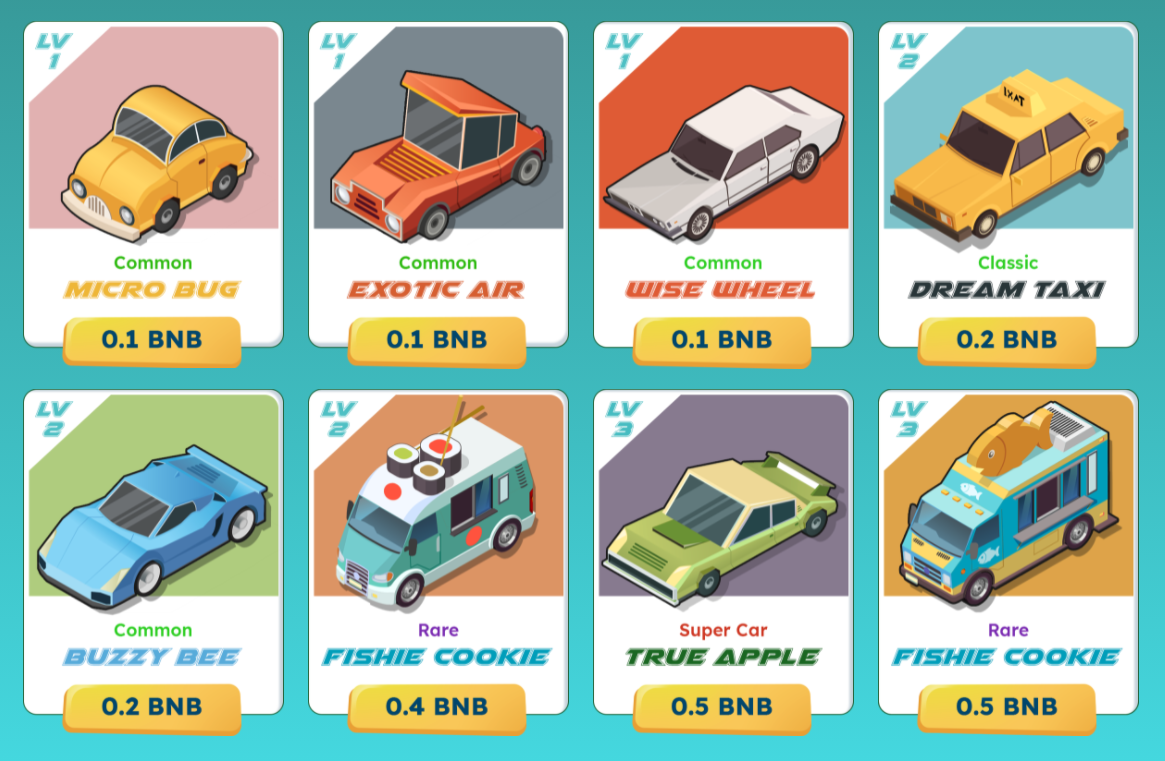Crypto Cars
Crypto cars are a novel concept that combines the worlds of cryptocurrency and automobiles. These vehicles are powered by blockchain technology, offering a unique set of features and potential benefits.
At the core of crypto cars is the use of blockchain, a distributed ledger technology that records and verifies transactions in a secure and transparent manner. This technology enables the creation of a decentralized system for managing vehicle ownership, maintenance, and transactions.
Blockchain Technology in Crypto Cars
The integration of blockchain technology into crypto cars brings several key advantages:
- Enhanced Security: Blockchain's decentralized and immutable nature makes it extremely difficult for hackers to manipulate or steal vehicle data.
- Transparency and Traceability: All transactions related to the vehicle, including ownership changes, maintenance records, and accidents, are recorded on the blockchain, providing a transparent and verifiable history.
- Decentralized Ownership: Crypto cars can be fractionalized and owned by multiple individuals, facilitating shared ownership models and reducing the barriers to vehicle ownership.
Potential Benefits of Crypto Cars
Crypto cars offer a range of potential benefits:
- Increased Efficiency: The use of blockchain can streamline vehicle management processes, reducing paperwork and administrative costs.
- Improved Safety: Blockchain-based vehicle data can be used to improve safety features, such as automated emergency braking and collision avoidance systems.
- Enhanced Convenience: Crypto cars can enable keyless entry, remote diagnostics, and automated payments, providing a more convenient driving experience.
Drawbacks of Crypto Cars
While crypto cars offer potential benefits, there are also some drawbacks to consider:
- Limited Availability: Crypto cars are still in their early stages of development, and their availability is currently limited.
- Regulatory Challenges: The regulatory landscape for crypto cars is still evolving, and it remains to be seen how governments will approach the taxation and licensing of these vehicles.
- Technical Complexity: The integration of blockchain technology into vehicles can introduce technical complexities that may require specialized knowledge to manage.
Types of Crypto Cars
Crypto cars are digital assets that represent ownership of virtual or physical cars. They can be classified into three main types: digital collectible cars, in-game cars, and real-world cars with crypto integrations.
Digital Collectible Cars
Digital collectible cars are non-fungible tokens (NFTs) that represent ownership of unique virtual cars. They are often used for collecting, trading, and investing. Some notable examples include CryptoKitties, Axie Infinity, and Decentraland.
Obtain a comprehensive document about the application of amazon crypto coin that is effective.
In-Game Cars
In-game cars are digital assets that can be used in video games. They can be purchased, sold, or traded within the game's ecosystem. Some notable examples include Forza Horizon, Gran Turismo, and Need for Speed.
Real-World Cars with Crypto Integrations
Real-world cars with crypto integrations are physical cars that have been equipped with blockchain technology. This allows for features such as secure ownership verification, automated payments, and remote control. Some notable examples include the Tesla Model S, the Porsche Taycan, and the Mercedes-Benz EQS.
For descriptions on additional topics like cryptocurrency investment, please visit the available cryptocurrency investment.
Crypto Car Market

The crypto car market is an emerging sector at the intersection of automotive and blockchain technologies. It involves the integration of cryptocurrencies and blockchain into the automotive industry, enabling innovative ownership models, payment systems, and decentralized vehicle management.
The market is still in its early stages but has witnessed significant growth and interest in recent years. Several factors are driving its expansion, including technological advancements, regulatory developments, and growing consumer adoption.
Market Size and Trends, Crypto cars
The global crypto car market size was valued at approximately $2.4 billion in 2022 and is projected to grow exponentially in the coming years. The market is expected to be driven by increasing demand for alternative ownership models, rising adoption of cryptocurrencies, and advancements in blockchain technology.
Examine how ftx crypto sam bankman fried can boost performance in your area.
Key trends shaping the crypto car market include the emergence of decentralized autonomous organizations (DAOs) for vehicle ownership, the development of blockchain-based supply chain management systems, and the integration of smart contracts into vehicle maintenance and repair processes.
Key Players
Several established companies and startups are actively involved in the crypto car market, including:
- CarVertical: Provides a blockchain-based platform for vehicle history and maintenance records.
- Electrify.Asia: Offers electric vehicle financing and charging solutions using blockchain technology.
- Porsche: Has launched a pilot program for tokenized car ownership and usage.
- Tesla: Has explored the potential of using blockchain for vehicle payments and data management.
- VeChain: Collaborates with automotive manufacturers to develop blockchain-based supply chain and logistics solutions.
Investment Opportunities
 Crypto cars present unique investment opportunities within the digital asset landscape. There are several ways to invest in crypto cars, each with its own potential risks and rewards.
Crypto cars present unique investment opportunities within the digital asset landscape. There are several ways to invest in crypto cars, each with its own potential risks and rewards. Purchasing Digital Collectibles
Digital collectibles are virtual representations of real-world assets, such as cars, that can be bought, sold, and traded online. Crypto car collectibles are typically tokenized on blockchain networks, providing ownership and authenticity. By purchasing these collectibles, investors can potentially gain exposure to the value of the underlying asset.Participating in Initial Coin Offerings (ICOs)
ICOs are a fundraising mechanism where startups issue new crypto tokens to investors in exchange for funding. Crypto car projects often conduct ICOs to raise capital for development and expansion. By participating in ICOs, investors can gain early access to promising crypto car projects and potentially reap significant rewards if the project succeeds.Risks and Rewards
As with any investment, investing in crypto cars carries both potential risks and rewards. Risks: - Volatility: Crypto car prices can be highly volatile, leading to potential losses. - Regulatory uncertainty: The regulatory landscape for crypto assets is still evolving, which could impact the value of crypto cars. - Technological risks: Crypto car projects rely on blockchain technology, which can be subject to security vulnerabilities. Rewards: - High potential returns: Crypto cars have the potential to appreciate in value, providing investors with significant returns. - Diversification: Investing in crypto cars can diversify an investment portfolio, reducing overall risk. - Early-stage opportunities: ICOs offer investors the opportunity to participate in promising crypto car projects at an early stage.Future of Crypto Cars

The crypto car industry is still in its early stages of development, but it has the potential to revolutionize the automotive industry. As the technology continues to mature, we can expect to see a number of new developments that will shape the future of crypto cars.
One of the most important trends in the crypto car industry is the development of new technologies that will make crypto cars more efficient, affordable, and accessible. For example, researchers are developing new battery technologies that will allow crypto cars to travel longer distances on a single charge. They are also developing new charging technologies that will make it easier and faster to charge crypto cars.
Emerging Trends
In addition to new technologies, the crypto car industry is also being shaped by a number of emerging trends. One of the most important trends is the growing popularity of ride-sharing services. Ride-sharing services allow people to share rides with others, which can help to reduce traffic congestion and pollution. Crypto cars are well-suited for ride-sharing services because they are efficient and affordable to operate.
Another important trend in the crypto car industry is the growing interest in autonomous vehicles. Autonomous vehicles are vehicles that can drive themselves without human input. Crypto cars are well-suited for autonomous driving because they are equipped with sensors and other technologies that allow them to navigate the roads safely.
Impact on Society
The crypto car industry has the potential to have a major impact on society. Crypto cars can help to reduce traffic congestion, pollution, and greenhouse gas emissions. They can also make it easier for people to get around, especially in areas where public transportation is limited. As the crypto car industry continues to develop, we can expect to see even more innovative and transformative technologies that will shape the future of transportation.
